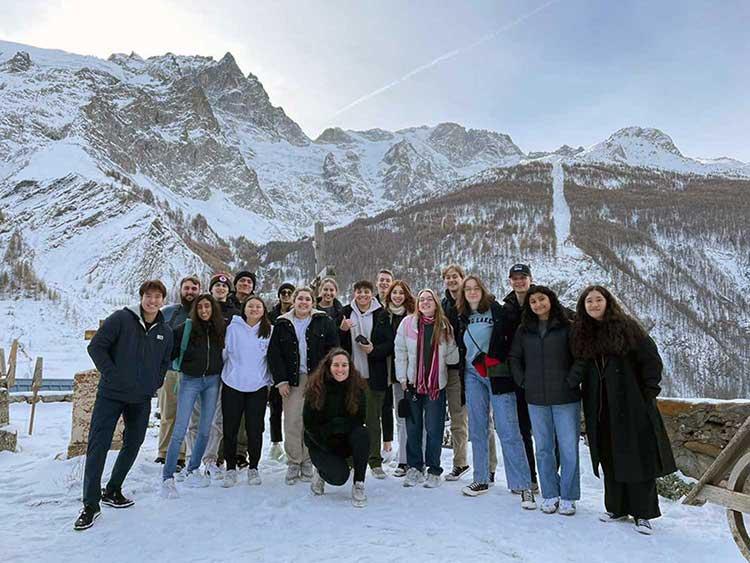Sustainability and Language: A Unique Study Abroad Experience in the French Alps
In an era where global sustainability is at the forefront of educational priorities, the University of Illinois Chicago (UIC) has unveiled an innovative study abroad program set against the breathtaking backdrop of the French Alps. This initiative, which combines immersive language learning with critical discussions on environmental stewardship, aims to equip students with both linguistic proficiency and a profound understanding of sustainable practices. As students navigate the stunning landscapes and rich cultural tapestry of the region, they will engage with local communities and experts, exploring how language and sustainability intersect in a rapidly changing world. This program not only offers academic growth but also fosters a deeper, more responsible connection to the environment, making it a compelling opportunity for the next generation of global citizens.
Exploring Environmental Stewardship in the French Alps
With its breathtaking landscapes, the French Alps serve not only as a backdrop for adventure but also as a living laboratory for students dedicated to understanding environmental stewardship. This unique study abroad program emphasizes the importance of sustainable practices through hands-on experiences. Participants engage in community projects that tackle pressing ecological issues, fostering a deep appreciation for local biodiversity while promoting conservation efforts. Students explore areas like:
- Renewable Energy Sources: Understanding the role of hydroelectric power and solar energy in the region.
- Wildlife Conservation: Collaborating with local organizations on species protection initiatives.
- Waste Management Practices: Analyzing how local communities reduce waste through innovative methods.
Language immersion complements the environmental focus, as students engage with local communities in French. This dual approach enhances their communication skills while deepening their understanding of how language shapes environmental discourse. In addition to classroom learning, students experience cultural activities that exemplify sustainable living, such as:
- Alpine Farming Techniques: Learning sustainable agriculture practices from local farmers.
- Culinary Workshops: Cooking with locally sourced, organic ingredients.
- Eco-Tours: Guided experiences that educate on the ecological significance of alpine ecosystems.
Language Acquisition Through Immersive Cultural Experiences
The study abroad program in the French Alps offers students a unique opportunity to immerse themselves in both the French language and the rich cultural heritage of the region. Participants will engage in interactive workshops that encourage practical use of language skills in real-world scenarios, including dining at local cafes, participating in festivals, and exploring the stunning alpine environment. This hands-on approach not only enhances language proficiency but also fosters a deeper understanding of the local customs and sustainable practices that shape the community.
Students will benefit from a diverse array of activities designed to enhance their linguistic capabilities while promoting sustainability. Key components of the program include:
- Environmental Workshops: Engage in discussions on sustainability initiatives.
- Community Projects: Participate in local conservation efforts while practicing French.
- Cultural Exchanges: Collaborate with French-speaking peers on joint projects.
This immersive experience not only helps in mastering the language but also instills a sense of global responsibility among the students, equipping them with the skills necessary to tackle future challenges related to sustainability.
Sustainable Practices in Alpine Communities
Alpine communities have become exemplars of sustainable living, intertwining traditional practices with modern eco-friendly innovations. These areas are redefining environmental stewardship by focusing on approaches that not only preserve their breathtaking landscapes but also enhance community well-being. A few key strategies include:
- Renewable Energy Sources: Many local households and businesses are increasingly utilizing solar panels and wind turbines, leveraging the region’s natural resources.
- Sustainable Agriculture: The promotion of organic farming and permaculture techniques supports biodiversity while providing fresh, local produce.
- Eco-Tourism Initiatives: Programs aimed at minimizing environmental impact draw visitors to experience the natural beauty and cultural heritage of the Alps responsibly.
The commitment to sustainability in these mountainous regions extends to education and community involvement, fostering a culture of environmental awareness. Local institutions are implementing educational initiatives that encourage residents and visitors alike to engage with sustainability practices actively. Noteworthy examples include:
| Program | Description |
|---|---|
| Eco-Workshops | Hands-on sessions teaching sustainable living practices. |
| Nature Conservation Days | Community-driven events focusing on preserving local flora and fauna. |
| Language and Sustainability Exchange | Programs connecting language learning with environmental projects. |
Recommendations for Future Study Abroad Programs in Eco-Conscious Regions
To enhance future study abroad programs in eco-conscious regions, it is vital to prioritize immersive experiences that blend sustainability with local culture. Programs should focus on hands-on learning where students actively participate in sustainable practices. This can include:
- Engagement in local conservation projects
- Workshops on traditional eco-friendly crafts
- Field trips to organic farms and renewable energy sites
- Cultural exchange activities that promote understanding of environmental stewardship
Additionally, the curriculum should integrate interdisciplinary approaches that connect language learning with environmental studies. Offering specialized courses that tie regional dialects to ecological themes can enhance linguistic skills while fostering a deeper appreciation for local biodiversity. Consider creating partnerships with local organizations to facilitate:
- Guest lectures from environmental experts
- Collaborative research opportunities with local universities
- Field studies to assess local ecological challenges
| Program Element | Expected Outcome |
|---|---|
| Eco-Workshops | Practical skills in sustainability |
| Cultural Exchange Activities | Increased cultural competence |
| Collaborative Research | Real-world impact on local communities |
Concluding Remarks
In conclusion, the study abroad program in the French Alps offers a unique convergence of sustainability and language education, setting a benchmark for future academic initiatives. As students immerse themselves in the breathtaking landscapes and vibrant culture, they are equipped with not only linguistic proficiency but also an enhanced understanding of environmental stewardship. This innovative approach fosters a generation of global citizens who are as committed to preserving our planet as they are to embracing diverse cultures. As UIC continues to expand its international offerings, the lessons learned in the heart of the Alps will undoubtedly resonate for years to come, inspiring both academic and ecological advancements around the world.




